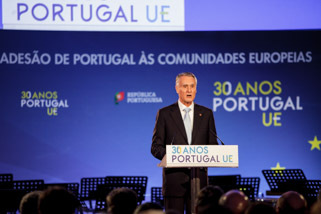
I am very pleased to be here with you, today, in this town of Castelo de Vide.
In the reopening of this so well refurbished Mouzinho da Silveira Cine-Theatre, this concert the “The Almocreves” has performed for us was a touching guise to distinguish another accomplishment for both Portuguese culture and identity: the inclusion of “Cante Alentejano” (traditional Alentejo chant) as an Intangible Heritage of Humanity, where it now joins the “Fado”.
The international recognition of this so genuine and unique form of expression floods us all with pride and should be used as an encouragement for the new generations to learn how to see in the past a reason to hope for a better future.
The consecration of “Cante Alentejano” calls upon us to view both our intangible and tangible heritage as strategic assets for our country, something that was bequeathed us, which we must value and preserve, but that we must also be able to use as an intrinsic factor to attract tourism and to promote the quality of peoples lives.
In the voices of these men, in the originality of their chant, we feel the heartbeat of Portugal and of the Alentejo.
It is our people’s soul that we hear in it, the strength of the Portuguese.
The beauty of its polyphonic cadence is so characteristic of the Alentejo that, wherever we hear it, we feel transported to this extraordinary region of our Country.
The inclusion of “Cante Alentejano” as an Intangible Heritage of Humanity extends across our borders, and values, the image of the Alentejo, of Portuguese culture and of the whole of Portugal itself.
I want to congratulate all who strived for the success of this candidacy. I am especially grateful to those who, through the strength of their voice, dedicate themselves to this art which is unique in the whole world.
Ladies and Gentlemen,
Castelo de Vide is the heir of an enormously rich history, construed by the convergence of diverse cultural and spiritual traditions.
King D. Pedro V will have called this land the “Sintra of the Alentejo”, due to the beauty of each nook and to the freshness of the Hills that surround it.
And this beauty arises together with the hospitality of the peoples of the Alentejo, which I warmly and fraternally greet.
A short while ago I visited a company that obtains from the land of Castelo de Vide, from the fountains of these Hills, the water that is nowadays on the tables of many Portuguese. Water which is also relished in many more remote locations. It is surely enough to refer that, in 2013, seven million litres of water collected in the Mountain of São Mamede were exported.
In these lands of the deep interior of our Country, where those that leave are always more than those who stay, the use to advantage of natural resources and of the cultural and landscape heritage are opportunities that we cannot allow going to waste.
As I have underlined on several occasions, the local authorities are, in a large measure, responsible for the dynamics of the interior, taking advantage of its economic potential and, at the same time, valuing the creativity and the resoluteness of the people.
It is essential to attract people, investment, tourists, events, companies and institutions. We are all aware of how important this is.
But, in the particular case of Castelo de Vide, it is also necessary to look into its historic identity. This is what the Castelo de Vide county council has been carrying out, and whose Mayor I am once again pleased to greet.
We find here one of the most important and well preserved example of the Jewish presence in Portugal.
Grievous mistakes were committed, in several instances of our History, against the Jews, with persecutions which we deplore and disavow. We overcame such errors earlier on. We have learnt the lesson of tolerance. We are now aware on how to live together with the diversity of our origins and with the pluralism of our ideas.
The Network of Jewish Communities in Portugal, where Castelo de Vide is included, is an excellent example of how, in the same Country, a relation of friendship and mutual respect can exist amongst differing religious and spiritual traditions.
Portugal is a nation of tolerance, a cohesive and pluralist nation. Whilst, around the World, we view worrying signs of incrementing racism, xenophobia, of religious intolerance, our Country asserts itself as a land where everyone can live together, respecting each one’s differences.
Mister Mayor,
I thank you, once again, for the invitation to visit Castelo de Vide and for the Alentejo experience you have afforded us.
My yearning is that this town continues preserving its beauty and the richness of its multicultural legacy. I am certain that, with everyone’s contribution, new means of development and of attracting investment will render more than ever expressive the number of those who live here and of those who come here to stay.
Thank you very much.
© 2006-2016 Presidency of the Portuguese Republic
You have gained access to the records of the Official Site of the Presidency of the Republic from 9 March 2006 to 9 March 2016.
The contents available here were entered in the site during the 10 year period covering the two mandates of President of the Republic Aníbal Cavaco Silva.